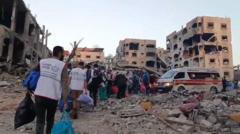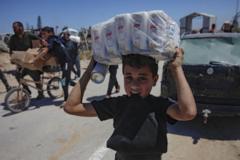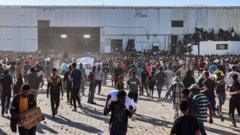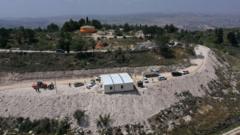In an alarming statement to the BBC, UN humanitarian chief Tom Fletcher has characterized Israel's blockade and military actions in Gaza as a form of forced starvation, raising serious concerns over potential war crimes. As aid slowly trickles into the region post-blockade, chaos ensues with desperate crowds overwhelming distribution centers. Fletcher’s comments reflect intensifying international criticism of Israel's military operations and highlight the urgent need for humanitarian relief.
UN Official Accuses Israel of Imposing Starvation in Gaza Amid Ongoing Hostilities
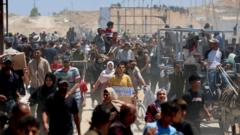
UN Official Accuses Israel of Imposing Starvation in Gaza Amid Ongoing Hostilities
The humanitarian crisis in Gaza deepens as a top UN official claims Israel's actions amount to forced starvation, escalating calls for international intervention.
The humanitarian crisis in Gaza continues to escalate as the United Nations' humanitarian chief, Tom Fletcher, publicly accused Israel of subjecting the region's population to forced starvation. In a recent interview with the BBC, he classified this situation as a potential war crime, urging an international response that holds accountable those responsible for such humanitarian violations. Fletcher's dire statements follow a temporary easing of the blockade, during which limited aid has begun flowing into the beleaguered enclave after nearly three months of severe restrictions on essential supplies.
Fletcher’s comments have amplified concerns about the humanitarian conditions under Israeli military operations, which resumed shortly after the blockade was lifted. The situation has become chaotic at distribution centers managed by the Gaza Humanitarian Foundation (GHF), with reports of injuries amid desperate crowds fighting for access to the much-needed supplies. While Israel argues that its measures are necessary to pressure Hamas for the release of hostages, Fletcher highlighted the stark reality: food and medical aid are languishing at the border, and civilians are paying a high price.
He said: "We’re seeing food set on the borders and not being allowed in when there is a population on the other side that is starving." Fletcher specifically called for Israeli Prime Minister Benjamin Netanyahu to disavow comments made by Finance Minister Bezalel Smotrich, who suggested that many in Gaza might seek to "relocate" out of despair. The remarks sparked outrage among advocates for humanitarian law, which Fletcher insisted must be upheld by governments worldwide.
As international condemnation mounts over Israel's actions, leaders from the EU, UK, France, and Canada have expressed their concerns and called for immediate humanitarian relief. Fletcher referred to historical precedents—the situations in Rwanda, Srebrenica, and Sri Lanka—where the global community failed to act in time to prevent atrocities and urged the UN Security Council to take decisive action to avert a potential genocide in Gaza.
Despite facing backlash for his earlier prediction that up to 14,000 babies could die within two days without aid, Fletcher defended his urgency but acknowledged the need for careful communication. He reiterated that mediation and negotiations must be pursued to resolve the conflict, lamenting the expanding scope of violence and disruptions that now seem disconnected from the initial objectives of securing the hostages taken by Hamas.
In confronting the complexities of the humanitarian crisis, Fletcher made it clear that he aims to prioritize the delivery of aid to civilians, taking a stand against the embezzlement of resources by militant groups. With ongoing crises in other regions like Ukraine and Syria, Fletcher underscored the increasing challenges for humanitarian operations globally, as divisions within the Security Council complicate efforts to ameliorate suffering caused by such violent conflicts.
The situation in Gaza remains dire, with the toll of violence continuing to rise. As military actions escalate, Fletcher's plea for humanity and urgent delivery of aid becomes an increasingly powerful call resonating through the halls of power and across the international community.




